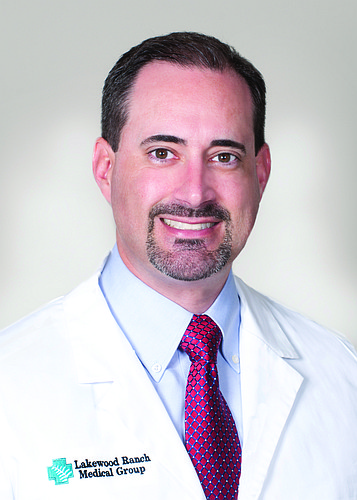- November 22, 2024
-
-
Loading

Loading

Lakewood Ranch Medical Center’s Dr. Reed Holland sees an average of 17 patients a day, and most are over 50 years old.
In terms of aging, he says there is a “trifecta” of preventive techniques to hold off common ailments.
Diet. Exercise. Weight loss.
“You do those things, you are going to prevent pretty much everything,” he said, adding they are crucial to maintaining healthy blood pressure, avoiding the risk of diabetes and even Alzheimer's disease, to an extent.
To get there, avoiding sodium is Holland's best advice.
“Minimizing sodium or salt is a big one,” Holland said. “If it is in a box or a can, it is going to have salt in it, unless they say otherwise. People think if they don’t use the salt shaker they’ll be fine, but most things are made with salt, because it’s a preservative, so if it’s in your pantry, it most likely has salt in it.”
Holland explained that sodium intake should be monitored, regardless of age. However, salt can be more problematic for older people. The FDA recommends between 1,500-2,300 milligrams a day. But, the average American consumes more than 3,000 a day.
“Over time, your blood vessels and arteries harden naturally,” Holland said. “Salt increases a lot things, but it is tied directly to blood pressure.”
Regular exercise makes it easier to maintain a healthy weight, which takes stress off the body. The heavier a person is, the harder it is on your joints and the more likely you are to have high blood pressure and/or diabetes.
“You do those things, you are going to prevent pretty much everything”
Because of this, the first thing Holland tells patients over the age of 65 is that they must stay active, getting up to 30 minutes of cardiovascular activity four to five times a week. For those who are already experiencing some form of arthritis, the need for low-impact exercise remains important to bone health.
“If you get arthritis from running, get on a bike or go in the pool, because that has a low impact on your joints,” Holland said. “Yoga is good too because it increases your flexibility and decreases your risk for injuries.”
Knowing your family history is another key component to staying healthy, and prepared, for what’s to come with old age.
“People underestimate that but that's huge,” Holland said. “You need to know what your parents have had, who had high blood pressure, heart disease — If your dad had a heart attack at 55, you need to start checking your blood work at 18, watch your blood pressure and cholesterol. Your family history really does matter.”
Many of the common eye diseases, such as macular degeneration or cataracts, can also be prevented with healthy blood pressure and diet.
Good vision
Blood pressure can also affect your vision as you age. Dr. Anita Shane with Coastal Eye Institute specializes in macular degeneration, diabetic retinotherapy, laser surgery, intraocular injections and vitrectomy surgery.
Shane said that the best thing someone can do over a lifetime to keep their eyes at their best is leading a healthy lifestyle — making sure your blood pressure isn’t too high, avoiding diabetes and not smoking.
These are some of the main actions people can take to prevent age-related eye diseases.
“Smoking actually can affect the nourishing layer underneath the retina, and it can then cause the retina to degenerate further,” Shane said. “That is a huge reason why we advise our patients to quit smoking.”
Shane said that the acts as a “window” into what is happening in the rest of the body.
When someone is having heart complications, eye specialists can simply look into the eye and see a patient’s abnormal blood vessels through the retina if the eye.
Eating healthy is also key to eye health, and no, this doesn’t mean simply eating carrots every day, though they are good for eye health because of their vitamin A. Everything in moderation is key.
“We generally suggest leafy green veggies, if someone is diabetic, we ask that they monitor their sugar intake and to make sure that their blood pressure is OK,” Shane said.
Ultraviolet (UV) light protection is also important.
“When you buy sunglasses, make sure they have UV light protection,” Shane said. “UV light can damage that nourishing layer underneath the retina, so this is similar to wearing sunscreen.”
Skin smart
As far as skin health goes — preventing wrinkles, specifically — Holland suggests staying hydrated.
"The most important thing is water for skin health overall," Holland said. "That will help arthritis, high blood pressure, kidney disease and all of the above."
Melanoma, skin cancer that older people can get as they age, is not preventable through diet, but wearing sunscreen can help.
"I tell all of my older people they have to wear 30 SPF (sun protection factor) minimum on their temples, nose and ears," Holland said. "If they are going to be in the sun, spray sunscreen and wear clothing."